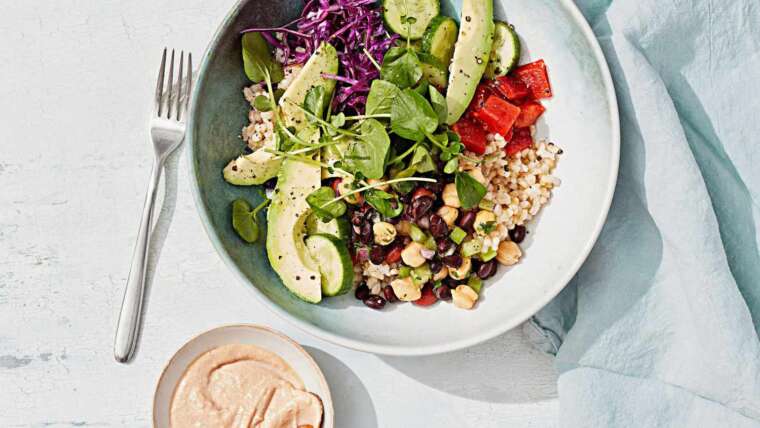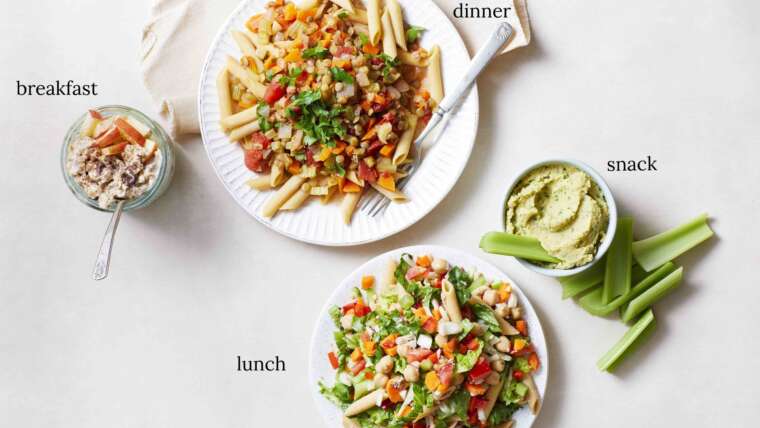Are you a vegan struggling to find enough protein sources? Or are you considering switching to a plant-based diet but worried about meeting your daily protein requirements?
You’ve come to the right place! In this ultimate guide, we’ll cover everything you need about vegan protein sources. From legumes and nuts to tofu and seitan, we’ll explore all the delicious and nutritious options. So grab your notepad, and let’s dive in!
What is Protein?
Protein is an essential macronutrient that helps build and repair tissues, produces enzymes and hormones, and boosts immunity. It’s also necessary for growth and development during childhood, adolescence, and pregnancy.
Most people get enough protein from their diet. Still, some groups of people may need to make sure they’re getting enough:
- Vegetarians and vegans
- People with certain medical conditions (such as kidney disease)
- Athletes
- Older adults
- Pregnant or breastfeeding women
Many vegan protein sources are available, including beans, lentils, nuts and seeds, tofu, tempeh, seitan, quinoa, spirulina, and chlorella. You can also find vegan protein powders from soy, pea, or hemp. With so many options available, getting the protein you need on a vegan diet is easy.
Why Protein is Important for Vegans
Protein is an essential macronutrient that helps our bodies to function properly. It is responsible for building and repairing tissue, making enzymes and hormones, and assisting the body to absorb nutrients.
Vegans need to be especially conscious of getting enough protein because they need it from animal sources. Animal proteins are complete proteins containing all the essential amino acids our bodies need.
This is not the case with plant proteins, so vegans must eat various protein-rich foods to get all the essential amino acids their bodies need.
Good vegan sources of protein include beans, lentils, nuts, seeds, and whole grains. With these foods in their diets, vegans can ensure they get enough protein to support their health and well-being.
Sources of Vegan Protein
If you’re following a vegan diet or considering making the switch, you might wonder where you’ll get your protein from. After all, protein is an essential nutrient that helps to build and repair cells, muscles, and tissues.
Not to worry! There are plenty of vegan protein sources out there. You might be surprised to learn that many common plant-based foods contain protein. Here are some of the best vegan protein sources:
–Beans and legumes: These include items like lentils, black beans, kidney beans, chickpeas, and soybeans. One cup of cooked black beans contains around 15 grams of protein.
–Nuts and seeds: Almonds, walnuts, flaxseeds, pumpkin seeds, and chia seeds are all excellent sources of vegan protein. Just one ounce of almonds (about 24 nuts) has 6 grams of protein.
–Tofu and tempeh: Tofu is made from soybean curds, and tempeh is made from fermented soybeans. Both are excellent sources of vegan protein–a half cup of tofu contains 10 grams of protein, while a half cup of tempeh has 16 grams.
–Seitan: This is a popular meat alternative made from wheat gluten. A quarter-cup serving has 21 grams of protein.
–Oats: Oats are whole grain and high in protein–a single cup of oats contains 6 grams.
–Quinoa: This is a popular grain packed with protein–one cup of cooked quinoa has 8 grams of protein.
-Nutritional yeast: This type of deactivated yeast is often used as an ingredient in vegan dishes. Two tablespoons contain 8 grams of protein.
Pros and Cons of a Vegan Diet
A vegan diet has many potential health benefits, including reducing your risk of heart disease, diabetes, and some types of cancer. However, a vegan diet can also have some drawbacks, including a lack of certain nutrients and an increased risk of certain health problems.
The pros of a vegan diet include the following:
1. Reduced risk of heart disease: A vegan diet can help reduce your risk of heart disease by lowering your cholesterol and blood pressure levels.
2. Reduced risk of diabetes: A vegan diet can also help lower your risk of developing type 2 diabetes.
3. Reduced risk of some types of cancer: A vegan diet may also help reduce your risk of developing certain types of cancer, such as ovarian and breast cancer.
4. Improved digestion: A vegan diet can improve digestion by increasing the fiber you consume. Fiber helps keep your bowels regular and reduces your risk of constipation and other digestive problems.
5. Increased intake of vitamins and minerals: A vegan diet is rich in vitamins and minerals essential for good health. Vitamin B12, for example, is found only in animal products, so vegans need to get enough from fortified foods or supplements.
The cons of a vegan diet include the following:
1. Potential nutrient deficiencies: Because a vegan diet eliminates all animal products, vegans may be at risk for deficiencies in certain nutrients, such as vitamin B12, calcium, and omega-3 fatty acids.
2. Increased risk of certain health problems: A vegan diet may increase your risk of developing certain health problems, such as iron deficiency anemia, osteoporosis, and kidney stones.
3. Limited food choices: Vegans must be careful when choosing their foods because their options are limited. This can make it difficult to get a balanced diet without supplementing with vitamins and minerals.
4. Social pressures: Sticking to a vegan diet in social situations where everyone else is eating animal products can be difficult. This can lead to social isolation or feeling judged by others for your dietary choices.
Recipes Featuring Plant-Based Proteins
You’ve come to the right place if you’re looking for recipe ideas that feature plant-based proteins. This section shares some of our favorite recipes featuring delicious and nutritious plant-based proteins.
One of our favorite ways to enjoy plant-based proteins is in a hearty chili. This chili recipe features black beans, quinoa, and lentils, all of which are excellent sources of plant-based protein.
This quinoa salad with roasted vegetables is a great option if you want something a little lighter. It’s packed with protein from the quinoa and roasted chickpeas and is delicious too!
These chocolate chip protein pancakes are a great option if you’re in the mood for something sweet. They’re made with banana, almond butter, and vegan protein powder, packed with nutrients and flavor.
And if you want something savory, these lentil veggie burgers are sure to hit the spot. They’re loaded with protein from the lentils and chickpeas and topped with avocado, tomato, and red onion for an extra flavorful punch.
Alternatives to Animal Products
If you’re looking for vegan protein sources, plenty of options are available. Here are some of the most popular vegan protein sources:
Beans and legumes: These versatile ingredients contain protein, fiber, vitamins, and minerals. Some popular varieties include black beans, lentils, and chickpeas.
Nuts and seeds: Rich in healthy fats, nuts, and seeds are a great way to add protein to your diet. Almonds, pistachios, and sunflower seeds are all good options.
Tofu, tempeh, and edamame: These soy-based products are excellent protein sources. Tofu can be used in various dishes, while tempeh and edamame make great snacks.
Plant-based proteins: Many plant-based protein powders are on the market, made from ingredients like pea protein, hemp protein, or rice protein. These can be a convenient way to get your daily dose of vegan protein.
Conclusion
We hope this article has helped you learn more about vegan protein sources and why they are important for a healthy lifestyle. With the right combination of plant-based proteins, you can ensure your body gets all the essential nutrients without sacrificing taste or health benefits.
Whether you’re looking for an alternative to animal products or want to try something new, we recommend giving these vegan protein sources a chance!

